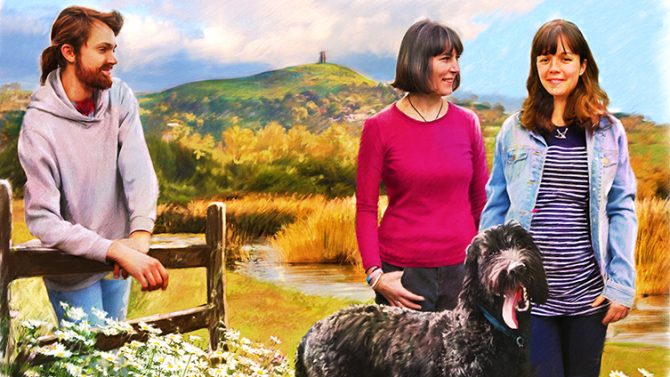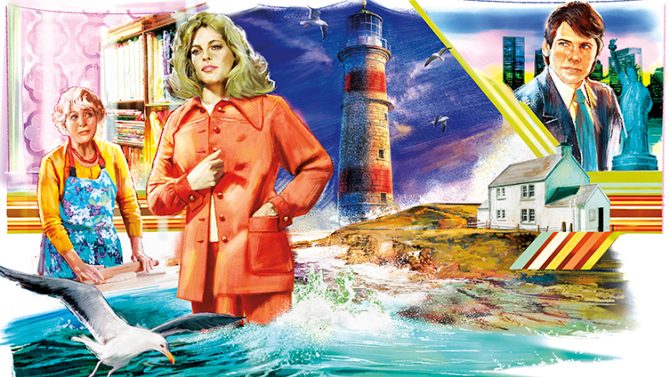Isle Of Second Chances – Episode 12

Isle Of Second Chances
« Previous Post- 1. Isle Of Second Chances
- 1. Isle Of Second Chances – Episode 12
“Stop mollycoddling me, Sandy!” Annie exclaimed. “I’m fit enough to get up and do things in the kitchen. The more you keep me sitting, the weaker I will get. I need to be up and doing!”
Sandy glanced over from filling the kettle at the sink.
“You’re fitter, yes, but still not fit enough. Our main problem right now is to stop you from doing too much too soon.”
“Fiddlesticks!”
Sandy sniffed.
“You never did take a telling,” he said. “Why should I expect you to see sense now?”
Frustrated beyond words, Annie glared at him.
His faded blue eyes met her grey ones unflinchingly.
“Glare away,” he said. “You don’t scare me.”
Annie’s sense of the ridiculous triumphed. Her anger vanished.
“Not ever?”
He had the grace to grin.
“Well, maybe at the start,” he said. “When you came over here as a young woman, determined to save the island and drag us into the twentieth century whether we wanted to be saved or not.”
“Just as well the island had more effect on me than I had on it.” She sighed.
“You know that’s not true.”
He poured boiling water into the earthenware teapot, swished it round and poured it out, then began to spoon in tea leaves – the one luxury Annie insisted on, because she couldn’t abide teabag tea. Sandy wore a woolly jersey she had knitted for him last Christmas, with wool he himself had spun.
“Sandy,” she said at last. “How long have we known each other?”
“Since time began,” he replied, busy.
“No, seriously. How many years?”
He paused, calculating.
“Forty years,” he replied. “No, nearer forty-five.”
“And how long have we been friends?”
“Most of that time,” he said wryly.
“I meant close friends, propping each other up.”
He turned slowly, his eyes hooded.
“Since we both lost the other half of ourselves.”
She nodded and he began to pour tea into their mugs.
“I don’t think I would have survived that loss, not without you,” Annie finally said.
“Likewise.”
Annie winced. Sandy was doling out words like he said his old grandfather had doled out Saturday pocket money – a penny at a time. Just when she wanted him to open up and talk.
“You’ve gone all grumpy on me,” she accused.
“That I haven’t.” He turned slowly, a mug in each hand. “Do you ever think about them?” he asked. “The dear ones we lost?”
“I do,” she said. “Almost every day.”
“Me, too. Sometimes I wonder what they would have made of us.”
All of a sudden, the kitchen clock sounded very loud.
“Don’t you think that they might have banged our heads together a couple of times at least?” she asked.
“Maybe,” he said guardedly, the defensive wall in place again.
She studied him in exasperation. No-one could have looked after her better in these past few weeks – indeed, these last few years.
He cared for her: that was evident in every gesture. And she cared for him, increasingly so. Their comfortable, long-term relationship had changed, as completely and irresistibly as the tide.
They needed to try to talk through their feelings for each other, and then about how to handle this change, not pretend that nothing had happened.
Out of nowhere, he surprised her.
“I doubt they would have wanted us to spend the rest of our lives in mourning for them,” he said gruffly, avoiding eye contact.
“Exactly.” Annie pounced on her chance. “They would have been the first to tell us to move on with our lives.”
Sandy nodded.
“Especially if we found someone who became dear to us,” she added.
For a few long seconds the faded blue eyes met hers.
“Aye,” he said. “It has maybe come to that.”
“So?”
The bushy eyebrows knitted down, folding over the top of his nose.
“So, do you want your tea before it gets cold?” he asked her, holding out a mug.
She waited for her sense of the ridiculous to come to her rescue. It didn’t. Then she looked up to see him smiling down at her.
“Annie?”
“Yes?” Her heart was beating faster.
“You were a bonnie woman when you were young. You’re a bonnie woman now.”
“In certain lights,” she replied, a little breathlessly.
“In any light,” he said. “Now, drink up your tea.”
It was a cliché, Nicola thought, but who cared?














